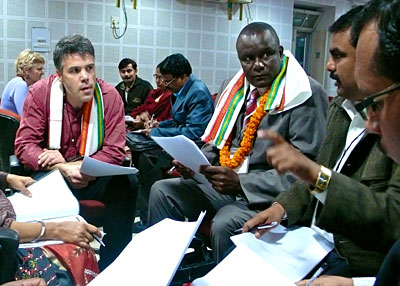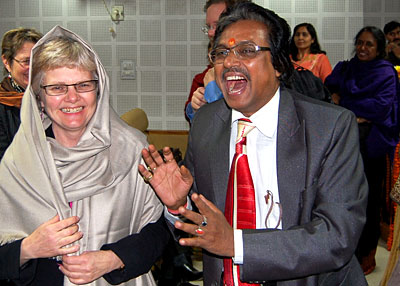Cyber literacy links librarians with counterparts in India
By Linda McCandless

In mid-December, four Cornell librarians and information technologists conferred with some 65 counterparts from India and Africa in India at a workshop on information literacy. One outcome of the trip is that librarians from India will come to Cornell to enhance their information linkages and knowledge.
"Management of e-journals and e-databases brings new challenges to library and information professionals at Cornell and universities in India," said Mary Ochs, director of Mann Library who was on the trip to Banaras Hindu University (BHU) in Varanasi, India.

The workshop, "Strengthening the Academic Library to Enhance Agriculture Education," focused on e-resource collection development, digitization of library collections, information literacy, library public computing and support for e-learning.
"In the 21st century, India's food security will depend on access to agricultural information, but electronic resources will be of no value if they are not used," said Ajay K. Srivastava, chief university librarian at BHU.
Since April 2011, Srivastava and Ochs have been developing a plan to help support libraries in the institutions in the consortium Agricultural Innovation Partnership (AIP), which sponsored the workshop; Cornell is the lead partner in the consortium.
"U.S. land grant institutions are a model for agricultural universities in India because we combine a rich agricultural research and teaching tradition with extension and outreach," said Ochs. India has 48 state agricultural universities and 97 institutes of clinical research. "Libraries can play an important role in these institutions in supporting the delivery of agricultural information."
Mann Library has been digitizing agricultural resources since 1995, said Joy Paulson, digital collection librarian. "But when rare manuscripts are from the 5th century B.C., written in Sanskrit, in gold, on palm leaves, the process is a lot more delicate. Many old manuscripts in India are difficult to access. Through digitization, BHU librarians will be able to preserve these resources and make them available electronically to scholars."
Jim Morris-Knower, the applied social science librarian at Mann, talked about the process to attain information literacy, and the kind of online tutorials that enable students and faculty to conduct successful research projects. "Information literacy and access to digital research help people become lifelong learners," he said. "In the present IT revolution, access to agricultural information is vital for agricultural and rural development."
BHU is at the forefront of Indian science and agriculture with its some 30,000 students, 2,500 research scholars and 650 foreign students from 34 nations. Like librarians at Cornell, Srivastava does not want cyber literacy to benefit only a few.
"Using what we have learned in the public computing areas of Mann Library, we can help BHU learn to manage [their] digital resources, keeping software up to date, loading agricultural and scientific resources and training users," noted Stefan Einarson, director of information technology for International Programs, who delivered a lecture on e-learning.
Funded in February 2011, the AIP brings together public universities and private partners in the United States and India to help reduce poverty and hunger in the Indo-Gangetic plains through increased sustainable regional food security and trade measures. AIP partners plan to enrich agricultural education through innovations in experiential learning, and transfer technology for improved farmer productivity through innovative extension interventions. AIP is funded by the American people through the Feed the Future initiative of the USAID.
Linda McCandless is associate director for communications in International Programs.
Media Contact
Get Cornell news delivered right to your inbox.
Subscribe